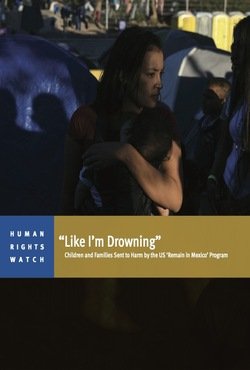By Julia Neusner and Kennji Kizuka. Eleanor Acer, Robyn Barnard, Licha Nyiendo, and Sydney Randall
On August 8, 2022, the Department of Homeland Security (DHS) announced the end of the Trump-era “Remain in Mexico” (RMX) policy. The announcement came after a federal district court, following a Supreme Court ruling in June 2022, lifted an injunction that had blocked the Biden administration’s termination of the policy and had compelled its reimplementation.
While the district court order was in effect, thousands more asylum seekers were returned by DHS to dangerous regions of Mexico. There they were forced to wait for immigration court hearings despite being almost entirely cut off from lawyers who could represent them in their requests for refugee protection. In December 2021, DHS stated that in reimplementing RMX it had taken steps to “enhance[] protections” and “protect[] individuals’ rights to a full and fair hearing.”
But the RMX policy—and others like it that would force asylum seekers to wait outside the United States for their cases to be heard—simply cannot be implemented lawfully, safely, fairly, or humanely. During the court-ordered reimplementation of RMX (or RMX 2.0), asylum seekers reported horrific kidnappings, rapes, and other violent attacks after DHS returned them to Mexico. RMX hearings also remained a due process farce. Only a tiny percentage of the individuals whose cases were decided under RMX 2.0 managed to find attorneys to represent them. A vanishingly small number of the mainly Cubans, Nicaraguans, and Venezuelans subjected to the policy were granted asylum—just 63 people out of more than 1,600 completed cases. This slow winddown process comes as state politicians aligned with the former Trump administration are, yet again, seeking to force the return of RMX. After the Supreme Court rejected their initial case, they amended their lawsuit to challenge the memoranda DHS issued to re-terminate the policy. In early September 2022, the same district court that ordered the Biden administration to restart RMX will consider this latest cynical ploy to force the policy’s continuation—an attempt to again block asylum seekers from safety and subject them to the horrifying human rights abuses detailed in this report. At the same time, the similarly harmful Title 42 policy remains in effect. A court order blocking its termination has resulted in the continued shutdown of normal asylum processing at ports of entry and continued expulsions to highly dangerous places, which at the moment overwhelmingly target asylum seekers and migrants from El Salvador, Guatemala, Honduras, and Mexico. Working closely with many other organizations, Human Rights First has monitored and reported on the Remain in Mexico policy since its inception in January 2019, conducting in-depth research and issuing a series of reports in February 2019, August 2019, October 2019, December 2019, January 2020, May 2020, December 2020, December 2021, and January 2022. This report is based on in-person interviews Human Rights First conducted with attorneys and RMX enrollees in Tijuana in April and September 2022; remote interviews held between April and September 2022 with attorneys and asylum seekers returned to Mexico under RMX 2.0; a review of anonymized notes from nearly 2,700 interviews conducted by pro bono law firms and non-governmental organizations providing legal information to individuals placed in RMX 2.0 (representing approximately one quarter of all people enrolled in RMX during the Biden administration); government data, media accounts, and other human rights reports.
New York: Human Rights First, 2022. 26p.



